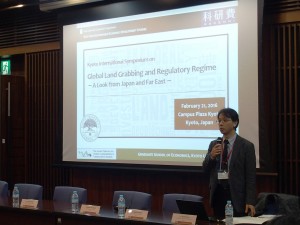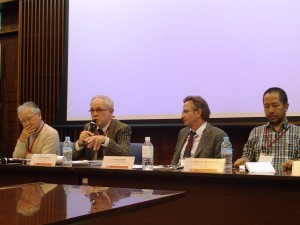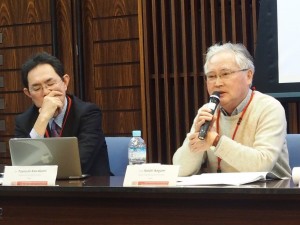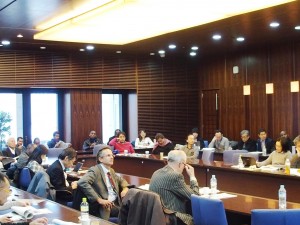It goes without saying that the issue of land grabbing has sparked controversies in recent years. Notwithstanding the extensive research produced on this subject, the fact remains that Japanese scholars are lagging far behind international researchers. To improve this visibility and in order to fill this gap, Dr. Shuji Hisano, Professor of International Political Economy of Agriculture at the Graduate School of Economics of Kyoto University and leading professor in the Module 1 of the AGST, Environmental Policy and Rural Development Studies with the support of students and the International Affairs Office of the Graduate School of Economics – organized a symposium on the theme of “Global Land Grabbing and Regulatory Regime – a Look from Japan and Far east“. This initiative is deeply embedded in the aspiration of Kyoto University, through the AGST project to be a gateway that bridges Japan with the rest of the world and to nurture knowledges that Japan can provide to improve sustainable development.

The symposium was held on February 21, 2016 at Campus Plaza Kyoto, an iconic place which emerged from the collaboration of a consortium of universities based in Kyoto and whose purpose is to promote human resources that can play a major role in the international community, while encouraging cooperation with local communities, government and industry as well as promoting regional development and revitalization. On the day, around 60 people, mainly from the academia, including professors and students from different disciplines, but also some from the civil society sector, gathered to listen and learn about a new sustainable regulatory framework on agriculture investments. The participants were all keen to see alternatives that would offer a space for investment policies that respect human rights and the environment in host countries at the first place. In addition to these two points, the promotion of good governance, the diffusion of best practices and more transparency from the investors and the countries there are hailing from were part of the main interests of the attendance.
The event marked the culmination of two projects funded by the Japan Society for the Promotion of Science (JSPS) namely Grants-in-Aid for Scientific Research: Project No. 25292139 – An International Comparative Study on Foreign Agricultural Investment and the Responsibility of Investing Countries under the Restructuring of Agrifood Regime, April 2013 – March 2016 (Project Leader: Shuji Hisano, Kyoto University) – and the Grants-in-Aid for Scientific Research: Project No. 26300014 – Political Economy Study on Food Security and Land Grabbing in Semi-arid Rural Africa, April 2014 – March 2017 (Project Leader: Tadasu Tsuruta, Kinki University). Professor Hisano’s project was divided into four modules: the first, a study of international organizations and civil societies. The second module focused on investing countries and transnational corporations. It covered studies on USA, Europe, Japan, South Korea and China. The third module was about the study of the host countries and the affected rural communities, these countries include: Mozambique, Tanzania, Indonesia, Malaysia, Chile, Madagascar, China and Far east Russia. The last module of the project is directly related to the symposium focusing on establishing a collaborative research network.
In his opening remarks, Professor Hisano reiterated his wish to reconnect Japanese scholars with international researchers in the context of a new food security era. He noted that the involvement of Japan in resource-seeking investments in agriculture has flown below the radar of international observers and the research conducted by scholars based in Japan is little known to the international public. Japan is however deeply taking part to massive investment in agriculture through its Official Development Assistance (ODA) and its private Banks in Africa, Southeast Asia, and South America amont others. Professor Hisano added that whether the outcome of such action is positive or negative, it is the role of the researchers to investigate. Nonetheless, the event was not only focusing on what is going on and how it can be improved, but also to make sure that researchers are getting things right in their academic inquiries.

The programme was organized in two sessions. The first session was dedicated to prominent international scholars. The first guest who gave a keynote speech was Dr. Saturnino Jun Borras, activist and Professor of Critical Agrarian Studies at the International Institute of Social Studies (ISS) in The Hague, Netherlands and Editor-In-Chief of Journal of Peasant Studies. The ensuing presentation was followed by Dr. Andreas Neef, Professor and Director of the Development Studies programme at the University of Auckland, New Zealand. Professor Neef Specialized in Agricultural Economics and Rural Sociology and whose research focuses on participatory approaches, rural innovation processes, natural resource governance, land grabbing, climate change adaptation and post-disaster recovery. The last presenter, yet not the least, is Professor Coomans, Head of the Department of International and European law and the Coordinator of the Maastricht Centre for Human Rights at Maastricht University, the Netherlands.
Jun Borras gave a new perspective on how to approach the analysis in the first two waves (“making sense” period and “deepening our understanding” period) and, potentially third wave (“beyond” specific land deal and country case studies, into “interaction, intertwining, convergence, spill-over, entanglement, and interconnection”) of land grab research. For Professor Borras, ‘the Challenge for “engaged researchers” is to do [something] that matters in the real world, in the lives and livelihoods of marginalized groups and classes of society’.
Professor Borras underlined five elements that are at the central core of this interconnectivity namely: Spatial, Political-economic, Political ecological, Institutional and finally, Temporal. A consideration of these elements is therefore very much expected to guide the future framework of analysis for the next coming years.
Professor Andreas Neef shed light on the “role of national land policy frameworks in driving land grabs in Southeast Asia”. He advanced three main arguments in his presentation: 1) the state has been the major land grabber in Southeast Asia, 2) customary and communal rights in Southeast Asia are neither recognized nor prioritized by the state and 3) Statutory land laws in SE Asia are designed to enable corporate land grabs and make them lawful.
Professor Fons Coomans outlined different possible ways that could be applied to regulate corporate activities in land deals through the concept of “Extra-territorial Obligations” (ETOs). The main message emphasizes on the principle that the state cannot do in a third country things it can’t do at home. Thus, states and companies are bound and abide by the same rules as they were in their home countries. This legal framework is already an existing tool known as the Maastricht Principles on Extraterritorial Obligations of States in the area of Economic, Social and Cultural Rights made available to the public from the following link http://goo.gl/X112Wj.

Two scholars from Japan presented their works in the second session. Professor Koichi Ikegami of Kinki University and former President of the Asian Rural Sociology Association and Dr. Toyoyuki Kawakami, activists and engaged researcher from Rainforest Action Network (RAN Japan), an international non-profit organization dedicated to the conservation of tropical forests. Both scholars presented their works on Japan’s involvement in investment in agriculture either through ODA or through Japanese financial institutions.
Professor Ikegami and his team examined the relations between the ProSAVANA Programme in the northern Mozambique and Agricultural Growth Corridor Development Projects and the way how Japan is involved in land grab. The project is jointly financed by Japan and Brazil to turn Mozambique fertile land into an export zone. Professor Ikegami pointed out in his presentation that lack of transparency, accountability and disclosure are the most obvious shortcomings of the ProSAVANA project. Also, there is an immense difference in terms of interpretation of what is considered as ‘idle or unused land’ which has been exploited by the project to evict small farmers from their properties. Additionally, the study reveals that the issue is not linked to productivity. It is noted that prior to the project, small framers recorded high productivity and were able to maintain a healthy living from their produce. They also managed to benefit from the activities which made it possible to send their children to school. This entire picture faded away when the project came in.
Dr. Toyoyuki Kawakami through his home institution conducted a research on 50 world major producers of palm oil, pulp and paper and tropical timber whose activities and operation impact natural tropical forests. Although data are still embargoed, the findings in the presentation of Dr. Toyoyuki demonstrated that Japanese Banks are deeply involved in damaging the environment. Millions of US$ have been so far invested by the Japanese companies in this sector of activities which are harming the life of poor people.

The presentations were followed by discussions chaired by Professor Hisano and Haja Rajaonarison. The questions were directly asked to the participants from the floor who presented different cases and scenarios part of their research or their own experiences/ case in their own countries. It was also a very good opportunity for graduate students to engage directly in discussions with leading professors whose names have been known so far in books and papers.
Professor Hiroshi ISODA from the faculty of agriculture of Kyushu university addressed his final remarks by thanking all the participants for their contributions. The symposium marks an important step in the relations between Japanese scholars and international researchers. A Japanese translation project of the book series of Agrarian Change and Peasant Studies, which is edited by Prof. Borras’s Initiatives in Critical Agrarian Studies (ICAS – www.iss.nl/icas), was one of the fruits of this exchange.



